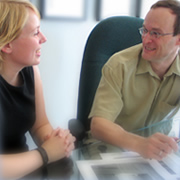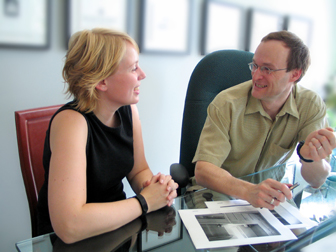Introducing Professional Supervision


Overview
This part of the course explains your role as a professional supervisor or mentor. We hope that the process of supervision will be an enriching one for both you and your student.
In this module we explore what professional supervision is all about. We look at the roles and responsibilities of both you and your student, and we introduce you to the process of being a reflective practitioner, which is a crucial activity in work-place learning.
Module outcomes

By the end of this module you will be able to:
- Understand what professional supervision/mentoring is
- Identify your role and responsibility as a professional supervisor/mentor
- Appreciate there may be tensions between your role as a supervisor/mentor and your role as a colleague or manager
- Understand the reflective practice approach
- Identify trainee's / student's role and responsibilities.
What is professional supervision?
You do not have the required browser technologies to view this content.
Performance is often discussed in organisations, but the language we use and the assumptions we make along the way are not always consistent. This task will help you to explore these.
Task
Think back over the past few days or weeks. What opinions have you heard experienced colleagues express about the performance of less experienced colleagues (including trainees or students on placements, if you have them)?
These opinions could be just passing remarks or perhaps accounts of specific incidents. For ideas on this, move your mouse over the pictures to view how a variety of professionals responded.
Record your thoughts in My Learning Journal, on the 'Colleagues' opinions' page.
If you have already saved My Learning Journal, as described in module 1, please open it now. If you have not yet set up your own journal, click on the link below and save the document to your computer.
- View our thoughts
-
The views on screen cover a broad range of ideas as being relevant to supervision, such as the relationship between theory and practice, the distance from real situations, professional conduct, differential capacities to learn from experience, how work conditions affect what supervision/mentoring is possible, and responses to poor performance.
There seem to be unspoken rules about what a good trainee / student is. For one person it is someone who doesn't ask too many questions. For someone else it is willingness to ask questions.
This course uses such comments as data. It is very hands-on and experiential. You are the main resource and you build up data through a good many learning activities focused on supervising/mentoring.
A personal perspective
You do not have the required browser technologies to view this content.
Before you continue, listen first to the comments of professionals, who have both supervised and been supervised, talking about their personal experience of supervision. Click on the audio player to listen to two different perspectives.
Do these comments ring true for you in your own context?
Keypoint
Being a supervisor/mentor is a two way process. You are a major resource for the student/trainee, whether you are doing formal supervision as part of the process of student/trainee qualification or being an informal buddy.
In a real learning organisation everyone benefits from structured support from colleagues, i.e. critical friendship.
Your role and responsibilities as a supervisor

Question
What does being a supervisor/mentor involve? Think about the responsibilities that a professional supervisor/mentor might have. (You may come up with more than are in your current role.)
Your role as a professional supervisor/mentor may include:
- Making a commitment to providing a minimum of number of hours of professional supervision spread throughout each of the work-based learning course. (Note: there may be a minimum requirement for your course; you may be in a position to offer a student additional supervision to this requirement; or there may be no guidance.)
- Coming prepared for supervision and ready to focus on the student's learning needs.
- Helping the student to identify issues and questions to explore in supervision.
- Enabling the student to explore their own work practice and values.
- Being prepared to share your own knowledge and understanding of best practice during supervision sessions, balancing this with the understanding that this is primarily space and time for the student's reflections and learning.
- Having a commitment to anti-oppressive practice.
- Being prepared to challenge the student's work practice and thinking in order to help them to learn.
- Acting on the guidance provided if any serious concerns arise in supervision.
- Making a commitment to reflecting and developing your own practice as a supervisor.
- Having a professional commitment to supporting good practice in your work context.
A supervisor's roles
You do not have the required browser technologies to view this content.
Your roles as a supervisor

Task
What roles do you think you will have to play in your Professional Supervision? What tensions might arise?
Open My Learning Journal and turn to the page 'My roles as a supervisor' to record your ideas. Don't forget to refer to the explicit advice and instructions provided by the course to which you are linked.
The responsibility of the student
Students also have responsibilities in relation to their professional supervision/mentoring too.
These responsibilities may include:
- Identifying a suitably qualified and experienced supervisor for their course
- Taking responsibility for making the initial contact with their supervisor
- Agreeing dates and times for meeting, and negotiating where supervision takes place
- Making a commitment to attending supervision sessions as arranged
- Coming prepared to supervision with an agenda and material that can provide a focus for the session
- Actively engaging in supervision and being prepared to reflect on practice, to learn and to be challenged
- Completing the required process recordings for each supervision session and for any other course assessment linked to supervision.
Again, specific courses will have different arrangements. Check those for the course you are linked to here.
Being a reflective practitioner
Throughout this course we refer to being a 'reflective practitioner'. We encourage you to explore your own work practice using a three stage model. The process of supervision follows the model closely and it is good to share this with your student/trainee. Click on the three headings for some questions to think about at each stage.
- Stage 1: Thinking about practice
-
What do I know about my current practice?
What do I know and believe about this area of practice? What new ideas do I want to explore or try out?
- Stage 2: Planning and doing practice
-
How am I going to explore these new ideas? Who am I going to work with?
How will I get feedback on this work?
How is the work going?
- Stage 3: Reflecting on practice
-
What have I learnt about my practice and values?
How will my learning change my practice now and in the future?
What other aspects of my practice do I need to develop?
Task
What benefits do you expect or hope to achieve for your own work practice during supervision? Record your thoughts in My Learning Journal in the section 'Benefits to my work practice'.
You may not have anticipated any, however we hope that the supervision/mentoring process will be a rewarding one for you too! In the process of considering a trainee's/student's practice you will naturally have to think about your own. We hope that this will open up learning opportunities for you too.
Summary

- In this section you have learned what professional supervision is.
- You have found out what your role and responsibility as a professional supervisor/mentor might be.
- You have discovered that there may be tensions between your role as a supervisor and your role as a colleague or manager.
- You have learned about the reflective practice approach.
- You have considered what your trainee's/student's role and responsibilities are.
You have now finished the Introducing Professional Supervision module, click on the exit button to close this window.
